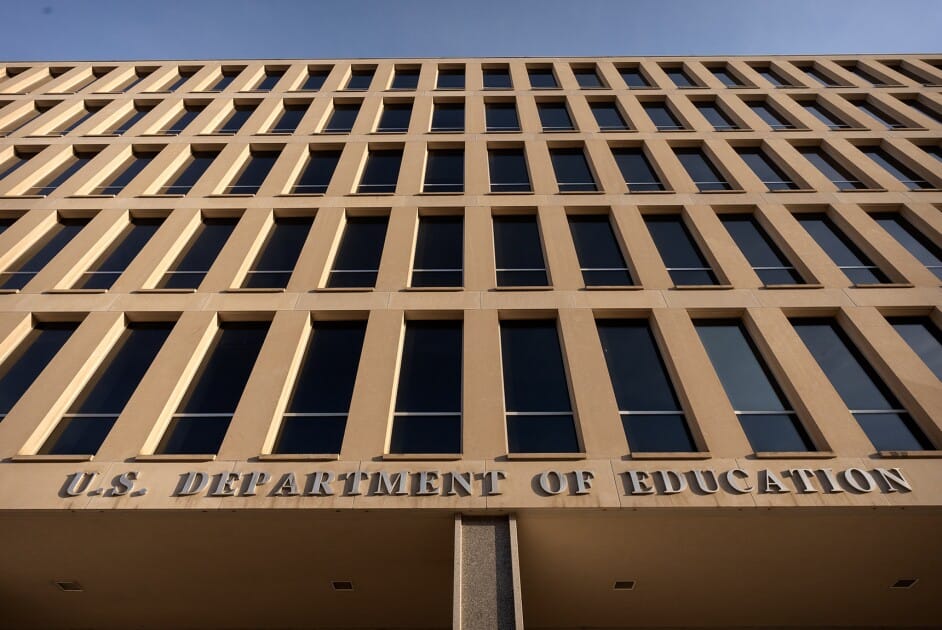A federal appeals court on Tuesday threw out a preliminary injunction that had blocked the Trump administration’s Department of Government Efficiency, or DOGE, from accessing sensitive individual records at the U.S. Department of Education and two other federal agencies.
A panel of the U.S. Court of Appeals for the 4th Circuit in Richmond, Va., ruled 2-1 to vacate an injunction issued in February by a federal district judge. The order had barred DOGE access of data at the Education Department, the Treasury Department, and the Office of Personnel Management.
The lawsuit, filed by the American Federation of Teachers along with other unions and a few individuals, had argued that DOGE was “steamrolling into sensitive government records systems” in ways that put data at risk and violated the Privacy Act of 1974.
DOGE is closely associated with Elon Musk, the billionaire entrepreneur and informal adviser to President Donald Trump. Musk left his White House role in late May and at times has been critical of some Trump policy prerogatives, but DOGE continues as a White House office with employees embedded at multiple federal agencies.
The AFT lawsuit claims DOGE employees improperly accessed the Student Loan Data System, containing records of some 43 million Americans, including teachers represented by the union. The suit did not mention DOGE accessing any K-12 student records potentially maintained by the department.
In February, a federal district judge in Maryland granted a temporary restraining order blocking DOGE’s access to the three agencies’ systems, and in March, the TRO was converted to a preliminary injunction, with the judge ruling the plaintiffs were likely to succeed on the merits of their suit. The injunction was meant to temporarily keep DOGE from accessing the data while the legal challenge played out.
Court majority discounts alleged privacy harms of DOGE access
The 4th Circuit quickly paused the preliminary injunction, restoring DOGE’s access to the data while it weighed some of the legal arguments more fully. In its Aug. 12 decision in American Federation of Teachers v. Bessent, the court said there were several procedural problems with the challengers’ case, but found that ultimately they would have difficulty proving that DOGE access would violate the Privacy Act.
“The DOGE-affiliated agency employees are tasked with a … broad and open-ended duty” to improve efficiency at the agencies, and they “would seem hard-pressed to know what needs improvement at their respective agencies before getting a lay of the land,” said Judge Julius N. Richardson, an appointee of President Donald Trump. (He was joined in the majority by Judge G. Steven Agee, a President George W. Bush appointee.)
Richardson also discounted the harms that might come from DOGE employees having access to the data of the plaintiffs.
“Each plaintiff’s information is one row in various databases that are millions upon millions of rows long,” Richardson said. “The harm that might come from this generalized grant of database access to an additional handful of government employees—prone as they may be to hacks or leaks, as plaintiffs have alleged—seems different in kind, not just in degree, from the harm inflicted by reporters, detectives, and paparazzi.”
The majority also cited a U.S. Supreme Court order in June that granted DOGE employees access to Social Security Administration files, over the dissent of three justices. That ruling came in an emergency docket order that did not explicitly rule on the merits of the underlying case but did give the Trump administration the access it sought.
“This case and that one are exceedingly similar,” Richardson said.
Writing in dissent, Judge Robert B. King, a President Bill Clinton appointee, said the district judge had written a “thorough and cogent opinion” holding that the challengers were likely to succeed on the merits of their Privacy Act claim.
DOGE has been “accorded sudden, unfettered, unprecedented, and apparently unnecessary access to highly sensitive personal information belonging to millions of Americans and entrusted to the U.S. Department of the Treasury, Department of Education, and Office of Personnel Management,” King said.
He noted that the full 4th Circuit plans to consider the merits of DOGE access more fully in the Social Security Administration case, to be argued in September.
2025-08-12 21:50:18
Source link

